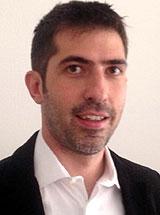A Specialist in Biological Implants for EPFL's New Medtronic Chair

© 2014 EPFL
The Council of the Swiss Federal Institutes of Technology (ETH board) announced today the appointment of Diego Ghezzi to direct the EPFL Medtronic Chair in Neuroengineering. At the close of the call for candidatures, it was the profile of the young Italian researcher that convinced the search committee.
 Diego Ghezzi, of the Italian Institute of Technology (IIT), is joining the team of EPFL’s Center for Neuroprosthetics with support from Medtronic, world leader in advanced medical technologies. This specialist in biocompatible implants will be actively involved with the Biotech Campus in Geneva.
Diego Ghezzi, of the Italian Institute of Technology (IIT), is joining the team of EPFL’s Center for Neuroprosthetics with support from Medtronic, world leader in advanced medical technologies. This specialist in biocompatible implants will be actively involved with the Biotech Campus in Geneva.
Graduating in 2004 from the Politecnico di Milano, Diego Ghezzi dedicated his doctoral thesis to the modulation of neuronal activity by optical devices. He is currently extending his research by focusing in particular on the development of electronic biocompatible implants using interactions between light and the functioning of neural networks. His promising work is heading towards the implementation of interfaces that not only can modulate neural networks but also can “read” their activity.
Starting in April 2015, Diego Ghezzi joins the team of the Center for Neuroprosthetics at its new premises on the Biotech Campus in Geneva-Sécheron. He will conduct his research there alongside professors Stéphanie Lacour (The Bertarelli Foundation Chair in Neuroprosthetic Technology), Grégoire Courtine (IRP Foundation Chair in Spinal Cord Repair) and Silvestro Micera (Translational Neural Engineering Laboratory).
Olaf Blanke, Director of the Center for Neuroprosthetics, welcomed the appointment. “The work of Professor Ghezzi is fully complementary and consistent with that of other researchers at the Center,” he said. His choice was made solely on the basis of the high quality of Ghezzi’s research. “Biocompatible implants represent an extraordinarily promising line of research with significant benefits on the horizon for patients with physical or neurological disorders.”
Steve Oesterle, Medtronic’s Senior Vice President for Medicine and Technology, said “the goal is to accelerate discovery and technology development broadly in neural engineering through expanded collaboration between EPFL scientists and Medtronic.”
EPFL’s Center for Neuroprosthetics is now equipped with six chairs, a staff of nearly 150 as well as being active in three locations (Lausanne, Sion and Geneva). The Center continues to expand at the interface of engineering and life sciences, remaining in constant dialogue with healthcare institutions that will enable the rapid transfer of research advances to patients.